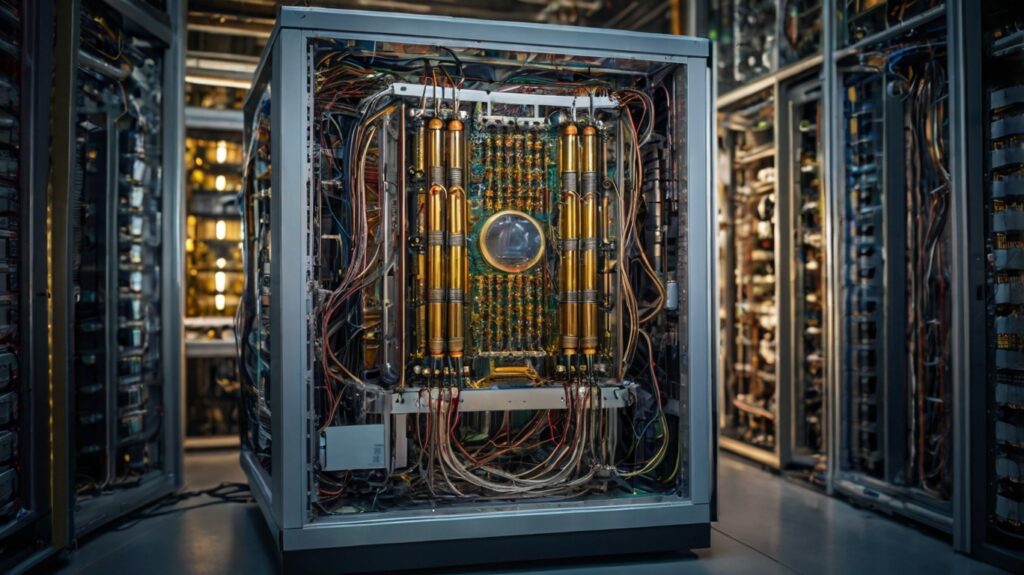Quantum Computing Simplified: A Beginner’s Guide
Quantum computing is perhaps of the most astonishing region in innovation today. But at the same time it’s intricate and frequently confounding. Conventional PCs work on pieces, ones and zeros, yet quantum PCs use something significantly more muddled: quantum bits, or qubits. While this could sound specialized, understanding the rudiments can be straightforward. We should separate it and investigate what makes quantum processing so unique and strong.
What is Quantum Computing?
Quantum computing is another kind of computing. Not at all like traditional registering, which utilizes pieces to handle information, quantum processing utilizes qubits. Pieces are paired; they are either 1 or 0, which makes old style PCs ideal for errands where information is handled in a successive, yes-or-no configuration. Qubits, then again, can exist as 1, 0, or both simultaneously, because of a peculiarity called superposition.
This special property permits quantum PCs to perform numerous estimations all the while, something old style PCs can’t do as effectively. It’s a crucial change in how information is handled and opens up additional opportunities for critical thinking in science, medication, and even cryptography.
Key Concepts of Quantum Computing
To understand quantum computing better, let’s go through a few essential terms.
1. Superposition
Superposition is the capacity of a qubit to exist in different states immediately. While a piece must be 1 or 0, a qubit can be in an express that is somewhat 1 and halfway 0. This capacity to be in different states gives quantum PCs their power. Maybe you could take care of a few issues all the while, as opposed to each in turn.
2. Entanglement
Snare is a remarkable component of quantum mechanics, and it’s essential to quantum registering. When qubits become caught, the condition of one qubit will straightforwardly impact the condition of another, regardless of whether they are far separated. This implies that quantum PCs can connect various qubits in manners old style PCs can’t, considering quicker and more productive computations.
3. Interference
Quantum computing likewise depends on obstruction. Impedance intensifies the right solutions to an issue while counterbalancing some unacceptable ones. By utilizing obstruction, quantum PCs refine computations and work on the exactness of their outcomes. It’s a sensitive cycle, yet it assumes an imperative part in making quantum estimations solid.
How Quantum Computers Differ from Classical Computers
The contrast among quantum and traditional PCs lies in their handling power and how they handle information. Traditional PCs depend on semiconductors, which depend on parallel logic. This arrangement functions admirably for assignments that include essential computations, similar to word handling or perusing the web.
Quantum PCs, nonetheless, are intended for complex computations that would take old style PCs years to finish. For example, traditional PCs could battle with recreating sub-atomic designs for drug disclosure, while quantum PCs could deal with these reproductions a lot quicker. This is on the grounds that qubits, with their capacity to all the while hold various states, process undeniably more information.

Why Quantum Computing is Important
Quantum computing could change different fields, from medical services to back to computerized reasoning. Here’s the reason it is important:
-
Drug Revelation and Medical care
Quantum PCs can reenact particles and foresee their cooperations, which could change drug disclosure. By examining sub-atomic designs quicker, researchers can foster new drugs and medicines all the more rapidly.
-
Cryptography and Security
Quantum computing is a situation with two sides for network protection. While it could fortify encryption, it likewise can possibly break large numbers of the present cryptographic frameworks. State run administrations and tech organizations are as of now investigating quantum-safe encryption strategies to get ready for this shift.
-
Man-made brainpower
Quantum computing could speed up AI processes, making simulated intelligence frameworks all the more remarkable and proficient. Complex calculations that could take traditional PCs days to process could run on quantum PCs in a moment or two.
-
Improvement Issues
Numerous businesses, similar to strategies and money, manage improvement issues. Quantum computing could tackle these issues all the more rapidly, setting aside time and cash.
Current Challenges of Quantum Computing
Quantum computing is promising, however it’s not yet prepared for boundless use. Building a steady quantum PC is staggeringly difficult. Qubits are delicate to their environmental factors, meaning any slight obstruction can upset their state. This issue, known as “decoherence,” makes it hard to keep up with qubit states to the point of performing significant computations.
Another test is scaling. While organizations like Google and IBM have gained ground in making little quantum PCs, growing enormous scope quantum frameworks that can outflank old style PCs in different errands stays complex.
When Will Quantum Computers Be Widely Available?
We are still years from regular quantum processing. Tech goliaths, colleges, and states are putting vigorously in this field, attempting to further develop security, scaling, and blunder remedy. Notwithstanding, researchers foresee it will require basically 10 years before we have quantum PCs fit for beating traditional PCs for an expansive scope.
Meanwhile, “quantum matchless quality,” where quantum PCs perform errands that traditional PCs can’t, has been accomplished in unambiguous analyses. These analyses show quantum processing’s true capacity however aren’t reasonable applications for ordinary use.
Conclusion
Quantum registering is a historic field with the possibility to change how we process data. While it could appear to be convoluted, the center ideas of superposition, snare, and impedance drive its power. However we might not have completely acknowledged quantum figuring’s true capacity, a promising innovation could change ventures around the world.
In time, as researchers beat difficulties, quantum PCs might turn into a significant piece of our day to day routines, opening ways to new revelations and developments. For the present, understanding the fundamentals can set us up for the staggering fate of processing that lies ahead.








